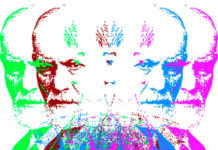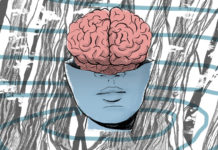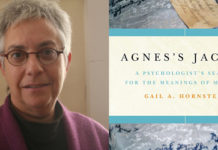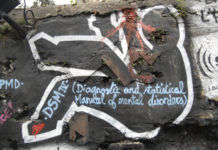Psychodynamic Therapy Revealed to be as Efficacious as Cognitive Behavioral Therapy
Meta-analytic study finds that psychodynamic therapy outcomes are equivalent to those of CBT and other empirically supported treatments.
Victim Blaming: Childhood Trauma, Mental Illness & Diagnostic Distractions?
Why, despite the fact that the vast majority of people diagnosed with a mental illness have suffered from some form of childhood trauma, is it still so difficult to talk about? Why, despite the enormous amount of research about the impact of trauma on the brain and subsequent effect on behaviour, does there seem to be such an extraordinary refusal for the implication of this research to change attitudes towards those who are mentally ill? Why, when our program and others like it have shown people can heal from the effects of trauma, are so many people left with the self-blame and the feeling they will never get better that my colleague writes about below?
The Conflicts That Result From Globalizing Euro-American Psychology in India
Researchers examine the transformation of work, life, and identity in India as a result of Western corporate and psychological culture.
Prazosin Ineffective for Preventing Suicidal Thoughts — May Worsen Nightmares
A new study found that prazosin was associated with increased insomnia and nightmares, and did not reduce suicidal thoughts.
Ambushed by Antidepressants for 30 Years
They helped me function for a while, but the debilitating side effects of antidepressants held me prisoner. I'm still having a hard time understanding how this could have happened. It's been suggested to me by a therapist that what I'm going through now is another kind of PTSD: the ongoing trauma of realizing what antidepressants did to me for 30 years.
Prolonged Exposure Reduces Dropout Rates and Symptoms for Individuals with Complex Trauma
New study finds that intensive prolonged exposure is a promising treatment option for individuals with multiple trauma experiences.
Trauma Resiliency Model: A New Somatic Therapy for Treating Trauma
Report presents new body-based therapeutic approach for shock and complex developmental trauma.
Changing Society’s Whole Approach to ‘Psychosis’
Fifteen years ago this month we were sitting together in the basement of Peter’s house. We had felt a sense of despair at the widespread misinformation and atrocious stereotypes that were dominating media coverage of mental health at the time. We felt that our profession had a responsibility to challenge these stereotypes, and that as psychologists we had something unique to contribute. That was the time when research into the psychology of psychosis was beginning to burgeon, and many of our findings challenged not only the stereotypes but – perhaps more significantly - much ‘accepted wisdom’ within mental health services as well.
Correcting Misconceptions of Trauma-informed Care with Survivor Perspectives
Trauma-informed approaches have the potential to promote recovery but must involve survivors and service-users to prevent the experience of retraumatization within psychiatric and mental health services.
Psychology Needs New Concepts and Healing Models for Racial Trauma
Contemporary empirical research explores new ways to conceptualize and heal racial trauma through anticolonial and sociohistorical lenses.
United Nations Report Calls for Revolution in Mental Health Care
In a new report, the United Nations Special Rapporteur on the right to health, Dr. Dainius Pūras, calls for a move away from the biomedical model and “excessive use of psychotropic medicines.”
Intensive Care Patients at High Risk for PTSD, Psychiatric Symptoms
People who survive life-threatening illnesses in the intensive care unit (ICU) of a hospital are at high risk for depression and anxiety and nearly...
Healing from an Addiction to Patterned Ways of Thinking
I had a soul-redemptive heart-to-heart reunion with a woman I had known from a distance but whom now (after our hours long coeur-a-coeur/heart-to-heart) I consider a close friend. I shared with her some very exciting and some challenging circumstances I have been experiencing of late. After I shared and shed a few tears she told me a story from her life that also poses, like my story, an invitation for profound change in our lives.
First-Person Accounts of Madness and Global Mental Health: An Interview with Dr. Gail Hornstein
Dr. Gail Hornstein, author of Agnes’s Jacket: A Psychologist’s Search for the Meanings of Madness, discusses the importance of personal narratives and service-user activism in the context of the global mental health movement.
Distinguishing Dissociative Disorders from Psychotic Disorders: Compounding Alienation
If a person recognizes the “alien” parts of themselves as being parts of themselves, they are likely to be seen as having PTSD or a dissociative disorder. If they see the “alien” parts of themselves as being literally aliens, or demons, they will likely be diagnosed as psychotic. But these experiences are really on a spectrum.
Decontextualized Depression and PTSD Diagnoses Fail Indigenous Communities
A case analysis of an American Indian woman illustrates how the DSM diagnostic criteria misrepresent the lives of indigenous people.
Time’s Up: Culture of Denial Impacts Mental Health of Sexual Abuse Survivors
Study finds that not believing sexual abuse survivors often leads to self-blame and mental health issues.
What Would a Trauma-Informed Society Look Like?
Imagine if we, as a society, started recognizing trauma, pain, grief, fear, the need for connection and understanding, and oppression without defensiveness or denial. What if, hypothetically, we saw the signs in people who were "defiant," "withdrawn," "oppositional," "depressed," "manic," or otherwise as desperate pleas to have their needs met, and stopped telling them they were sick for doing so? What would a society that actually encouraged expression of emotion, compassion, and empathy look like?
Hearing Veteran Narratives is Key to Suicide Prevention
Current suicide assessment practices of the VA are reductive and do not allow for the individual’s narrative to be heard.
What It’s Like to Be Involuntarily Committed
Ten years after being fired for taking a mental health leave after the Virginia Tech massacre, I was diagnosed as "schizophrenic" and involuntarily committed to a hospital. Now I have a job and a life, but I'm still forced to take drugs and report to a social worker.
Study Examines Women’s Experiences of Hearing Voices
An international group of researchers from multiple disciplines has published a historical, qualitative, and quantitative investigation into voice-hearing in women. The interdisciplinary project, freely available from Frontiers in Psychiatry, explores how sexism, exploitation, and oppression bear on women’s’ experiences of hearing voices.
Study Finds Increasing Minimum Wage can Decrease Child Maltreatment
Increasing the minimum wage - even modestly - can lead to less cases of child abuse in the home.
Non-Medical Treatments for PTSD Effective, Study Suggests
Group-based MBSR and PCGT therapies effective as a complementary treatment for PTSD.
What if ACEs (Adverse Childhood Events) Were the Basis of Mental Health Treatment?
What would happen if the mental health system fully recognized the pervasive and profound impacts of trauma on their clients? How might a deeper appreciation of the multi-faceted sequelae of childhood maltreatment and toxic stressors reshape mental health services? While the implementation of trauma-informed care in mental health programs has made significant inroads, the dominant bio-reductionist model continues to constrain and undermine progress.
Research Is Shedding New Light on Hearing Voices
From Psychology Today: Although auditory hallucinations are commonly thought of as a sign of mental illness, research shows that hearing voices is common among the general population...



























